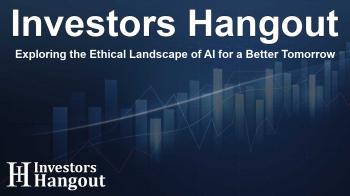Exploring the Ethical Landscape of AI for a Better Tomorrow

Unleashing the Potential of Artificial Intelligence
Artificial Intelligence (AI) has transitioned from a concept dreamed up by pioneers like Edmund Callis Berkeley to a transformative force impacting every facet of our lives. This evolution raises vital discussions around the intersection of technology and ethics.
AI and Human Empowerment
AI is revolutionizing our interactions, professional endeavors, and daily routines. Experts, such as Zeng Yi from the Institute of Automation, emphasize that AI is not just about technology; it’s about liberating us from mundane tasks. By incorporating robotics, we can shift our focus from repetitive duties to creative endeavors that truly add value to our lives.
Zeng's insights are pivotal; he points out how AI-powered robots are already engaging in high-risk jobs like firefighting and disaster relief. For instance, lunar rovers utilize advanced AI to conduct critical analyses on the moon—operations that would be perilous for human astronauts.
In addition, the integration of AI in environmental conservation is noteworthy. AI is facilitating wildlife tracking and conservation efforts, illustrating its potential in preserving nature.
AI in Everyday Life
The benefits of AI extend into our everyday experiences, significantly enhancing road safety. Gao Shaolin, an authority at Peking University, pointed out how he recently embarked on a 3,000-kilometer road trip without encountering a single accident, thanks to evolving AI technologies in vehicles.
Innovations in AI-driven safety features—from fatigue detection in trucks to autonomous driving capabilities—are making it increasingly rare for accidents to occur. Yet, both Zeng and Gao stress the importance of viewing AI as a complement to human abilities rather than a replacement. Such a perspective encourages a harmonious collaboration where AI enhances human creativity and productivity.
The Ethics of AI Development
As AI technology advances, ethical considerations become paramount. Berkeley once noted the challenge scientists face in guiding innovations effectively. This concern is echoed by Gao, who underscores the necessity for accountability in AI’s development and deployment. Current AI systems are tools created by humans and, thereby, the responsibility for their impact rests with their developers and users.
Gao firmly believes AI should remain under human oversight to ensure it serves humanity positively. The sentiment is echoed by Wu Baojun, who emphasizes the pressing need for reliable AI that aligns with ethical frameworks.
China's Innovative Approach to AI Governance
China stands at the forefront of AI innovation while advocating for ethical governance. The country has rolled out sophisticated regulations emphasising human-centered AI development. This was highlighted in the Next Generation Artificial Intelligence Development Plan, which encourages diverse methodologies and places a significant emphasis on ethical governance.
The implementation of guidelines such as the Beijing AI Principles marks a commitment to uphold privacy and human rights as core tenets of AI research. Moreover, the recent UN resolution underscores the global movement toward responsible AI development.
International Cooperation and AI Ethics
As nations seek to manage the ethical implications of AI, global cooperation is essential. Zeng's research reveals a high degree of consensus among countries regarding ethical standards, focusing on principles like transparency, safety, and human-centric development. The Bletchley Declaration and the UNESCO Recommendation serve as critical milestones in fostering international dialogue on AI safety.
Ultimately, the future of AI must prioritize collective intelligence over competition. Gao eloquently states that AI must benefit all, suggesting that efforts to guide AI technology should unite nations under the shared goal of fostering innovation for societal good.
Frequently Asked Questions
What is the significance of AI in today's world?
AI holds the key to transforming industries by automating tasks, enhancing safety, and promoting innovation across various fields.
How does AI enhance human creativity?
AI complements human skills, allowing us to focus on creative endeavors as it takes on repetitive and labor-intensive tasks.
What ethical considerations surround AI development?
Accountability, privacy, and the need for reliable regulations are central to the discourse on responsible AI development.
How is China leading in AI governance?
China is implementing comprehensive regulations and guidelines that emphasize ethical governance and human-centric development.
What role does international cooperation play in AI ethics?
Global collaboration is crucial for ensuring that AI technologies benefit all nations and uphold common ethical standards.
About Investors Hangout
Investors Hangout is a leading online stock forum for financial discussion and learning, offering a wide range of free tools and resources. It draws in traders of all levels, who exchange market knowledge, investigate trading tactics, and keep an eye on industry developments in real time. Featuring financial articles, stock message boards, quotes, charts, company profiles, and live news updates. Through cooperative learning and a wealth of informational resources, it helps users from novices creating their first portfolios to experts honing their techniques. Join Investors Hangout today: https://investorshangout.com/
Disclaimer: The content of this article is solely for general informational purposes only; it does not represent legal, financial, or investment advice. Investors Hangout does not offer financial advice; the author is not a licensed financial advisor. Consult a qualified advisor before making any financial or investment decisions based on this article. The author's interpretation of publicly available data shapes the opinions presented here; as a result, they should not be taken as advice to purchase, sell, or hold any securities mentioned or any other investments. The author does not guarantee the accuracy, completeness, or timeliness of any material, providing it "as is." Information and market conditions may change; past performance is not indicative of future outcomes. If any of the material offered here is inaccurate, please contact us for corrections.
